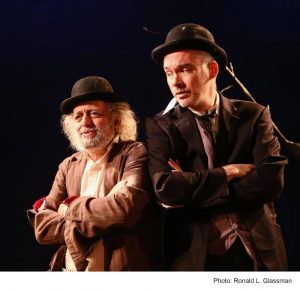

Waiting for Godot has been staged time and time again, in many different contexts and by many different casts, since its Paris premiere in January, 1953, over 60 years ago. However, after seeing what at first glance seemed an odd theatrical choice -- a staging in Yiddish, by the New Yiddish Rep -- one is hard pressed to imagine the play in any other language.
Waiting for Godot is a play weighted with loss, with the search for meaning and its frustration, and with people who are moved by circumstances and events beyond their control. It was written in the aftermath of WWII, in the wrecked, devastated landscape of post-war Europe. Considering the fact that WWII brought on the decimation of Yiddish language and Yiddish culture with the decimation of its population, the play is lent a particular meaning in Yiddish both from within and from beyond its cultural context: the line “I can’t go on, I’ll go on” becomes both the cry of desperation and the cry of determination to endure that it was meant to be.
Beyond the cultural context, the play’s actors -- all skillful and nuanced in their performances -- lend the traditions of Yiddish theater to Waiting for Godot to great effect. Estragon and Vladimir (David Mandelbaum and Shane Baker), the two tramps at the center of the story, do the titular waiting with the perfectly balanced tragedy and comedy that defined and continues to define Yiddish theatrical traditions. With equal measures clownish absurdity and deep existential weariness and concern, Estragon and Vladimir, along with the tyrannical Pozzo (Alan Lewis Rickman) and the downtrodden, broken Lucky (Rafael Goldwaser) wander through the cyclical, labyrinthine wasteland of their world, occasionally chancing upon one another. Yiddish is a language of exile, and there’s a certain hopelessness in exile, but this production lends a deeper, more nuanced understanding to what it is to wander and what it is to seek -- one which suggests that the point is in the waiting, the striving, rather than any arrival of any Godot.

Moshe Yassur, the play’s director, has been quoted as saying that he does find that strain of optimism in what appears to be a play dominated by themes of futility. “Man knows exactly what his end is,” he told The New Yorker’s Kelsey Osgood, “and yet he also wakes up every morning, goes to work, and does the same thing the two hobos do, Estragon and Vladimir. They know exactly their futility, and that there is no sense in waiting. The waiting is their task, they are saying all the time, ‘Are we bound to something?’ Yes. They are bound to the waiting.” There is certainly something to be said about what this means for those who persist in preserving and celebrating Yiddish culture, to stage Yiddish theater to an audience with few if any native Yiddish speakers, as an act of endurance despite the knowledge that almost complete cultural annihilation was possible and almost achieved. And yet, we wait, and we seek.
Through September 21 at Barrow Street Theatre.